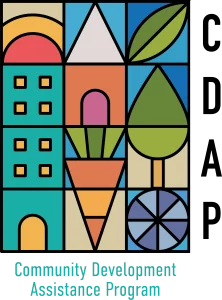
What happens when artists and culture workers collaborate with planners, community leaders, and governmental staffers to tackle a community planning challenge?
This was the question behind this year’s Arts Leaders of Metro Atlanta (ALMA) Workshop. This year’s class of 32 spent three months taking part in active virtual workshops with creative professionals and artist-advocates from around the region and across the country, learning about how artists can help lead community planning projects — all while working together to create their own creative, cross-sector proposals for community planning challenges in metro Atlanta.
This represented a change from ALMAs of years past, in which arts and culture leaders learned about a broad range of ideas and issues. Several other significant changes aimed at advancing equity in ALMA were implemented this year as well, including updating the application process to diversify the ALMA class, providing a stipend for working artists, and compensating guest speakers.
The result was six unique proposals, reviewed by a similar cross-sector group of distinguished jurors from across the Atlanta region. More fundamentally, the outcome was a deeper understanding of what’s possible when creative professionals are brought into planning and community engagement from the very beginning.
“A fundamental part of so many artists’ practices is listening to the communities they work in and are rooted in,” said Marian Liou, ARC’s Community Engagement and Arts Program Manager, who also noted that artists and planners often share the same vision: of creating a just, strong community. “And so, when they are not merely invited to provide input, but lead communities in imagining new worlds, the result will have greater impact.”
Highlights from the Planning Proposals:
Alleys in Tucker
Two groups presented proposals that would integrate public art into the alleyways of downtown Tucker, a project which is part of the 2021 ARC Community Development Assistance Program. Teams were challenged to bring in public engagement in order to enhance sense of place and make all residents and visitors feel welcome. One proposal included challenges to the city to re-think its “storyline,” as well as additions such as creative shade seating, greenspace, and play installations. Another proposal included adding artistic embellishments to the sky above the alleys similar to the “Flight Paths” exhibit at Hartsfield-Jackson Airport, as well as mural projects — and suggestions for a citywide arts ordinance and sample criteria for evaluation of projects.
Bus Stop Creative Placemaking
Two teams proposed plans for creative placemaking at bus stops, to improve access and promote community. One group envisioned the often-unmet needs of transit riders — from basic safety, to shelter, to dignity and enjoyment — as a pyramid, informed by Maslow’s Hierarchy of Needs. A second proposed sparking conversations about our collective past, present, and future by installing public art at bus shelters along two bus routes that connect the King Center and the Carter Center. This bus stop creative placemaking prompt tied into two 2021 ARC LCI projects dedicated to bus stop safety and placemaking.
Our Region Remembers
Two groups made recommendations for artist-led community engagement around memorializing the impact of COVID-19. Recommendations included a temporary, mobile “Healing Hall” installation and a proposed artist residency program that could be adapted and replicated throughout the region. Ideas from these projects will be incorporated into the community engagement process for various upcoming ARC regional plans, such as the Comprehensive Economic Development Strategy and the policy framework for the Atlanta Region’s Plan.
(See all proposals and presentations from the forum here.)
The day wrapped with a panel discussion in which participants reflected on their takeaways from the experience.
Dunwoody Mayor Lynn Deutsch remarked, “One thing this taught me is how little I really knew. I’m a consumer of the arts, but I’m not an artist…and what I’ve taken away, from a municipal perspective, is that having an artist on board initially is really the best way to get things done.”
“I think we’ve all learned that arts is more than entertainment,” said Jacquelyn Pritz, a dance artist and operations manager with DanceATL, “— that we are part of the culture and environment, and that community engagement is more than just the end product. There are engagement touch points throughout.”
What’s Next ATL, produced by the Atlanta Regional Commission, is a community resource that explores how metro Atlanta is growing and changing, and how the region is addressing its most pressing challenges.








